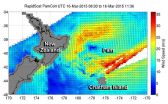(Press-News.org) An analysis of genetic and lifestyle data from 10 large epidemiologic studies confirmed that regular use of aspirin or other non-steroidal anti-inflammatory drugs (NSAIDs) appears to reduce the risk of colorectal cancer in most individuals. The study being published in the March 17 issue of JAMA found that a few individuals with rare genetic variants do not share this benefit. The study authors note, however, that additional questions need to be answered before preventive treatment with these medications can be recommended for anyone.
"Previous studies, including randomized trials, demonstrated that NSAIDS, particularly aspirin, protect against the development of colorectal cancer, but it remains unclear whether an individual's genetic makeup might influence that benefit," says Andrew Chan, MD, MPH, of the Massachusetts General Hospital (MGH) Gastroenterology Division, co-senior and co-corresponding author of the JAMA report. "Since these drugs are known to have serious side effects - especially gastrointestinal bleeding - determining whether certain subsets of the population might not benefit is important for our ability to tailor recommendations for individual patients."
The research team analyzed data from the Colon Cancer Family Registry and from nine studies included in the Genetics and Epidemiology of Colorectal Cancer Consortium - which includes the Nurses' Health Study, the Health Professionals Follow-up Study and the Women's Health Initiative - comparing genetic data for 8,624 individuals who developed colorectal cancer with that of 8,553 individuals who did not, matched for factors such as age and gender. The comprehensive information on lifestyle and general health data provided by participants in the studies again confirmed that regular use of aspirin or NSAIDs was associated with a 30 percent reduction in colorectal cancer risk for most individuals. However, that preventive benefit did not apply to everyone, and the study found no risk reduction in participants with relatively uncommon variants in genes on chromosome 12 and chromosome 15.
"Determining whether an individual should adopt this preventive strategy is complicated, and currently the decision needs to balance one's personal risk for cancer against concerns about internal bleeding and other side effects," states Chan, who is an associate professor of Medicine at Harvard Medical School. "This study suggests that adding information about one's genetic profile might help in making that decision. However, it is premature to recommend genetic screening to guide clinical care, since our findings need to be validated in other populations. An equally important question that also needs to be investigated is whether there are genetic influences on the likelihood that someone might be harmed by treatment with aspirin and NSAIDs."
INFORMATION:
The lead author of the JAMA report is Hongmei Nan, MD, PhD; formerly a research fellow at Brigham and Women's Hospital and now on the faculty at the Fairbanks School of Public Health and the Simon Cancer Center at Indiana University. Li Hsu, PhD, of the Fred Hutchinson Cancer Research Center is co-corresponding author, and Ulrike Peters, PhD, MPH, also of Fred Hutch, is co-senior author. Support for this study includes several grants from the National Cancer Institute and the National Institute for Diabetes and Digestive and Kidney Diseases.
Massachusetts General Hospital, founded in 1811, is the original and largest teaching hospital of Harvard Medical School. The MGH conducts the largest hospital-based research program in the United States, with an annual research budget of more than $760 million and major research centers in AIDS, cardiovascular research, cancer, computational and integrative biology, cutaneous biology, human genetics, medical imaging, neurodegenerative disorders, regenerative medicine, reproductive biology, systems biology, transplantation biology and photomedicine.
Among approximately 19,000 individuals, the use of aspirin and nonsteroidal anti-inflammatory drugs (NSAIDs) was associated with an overall lower risk of colorectal cancer, although this association differed according to certain genetic variations, according to a study in the March 17 issue of JAMA.
Considerable evidence demonstrates that use of aspirin and other NSAIDs is associated with a lower risk of colorectal cancer. However, the mechanisms behind this association are not well understood. Routine use of aspirin, NSAIDs, or both for prevention of cancer is not currently ...
In a study in which pathologists provided diagnostic interpretation of breast biopsy slides, overall agreement between the individual pathologists' interpretations and that of an expert consensus panel was 75 percent, with the highest level of concordance for invasive breast cancer and lower levels of concordance for ductal carcinoma in situ and atypical hyperplasia, according to a study in the March 17 issue of JAMA.
Approximately 1.6 million women in the United States have breast biopsies each year. The accuracy of pathologists' diagnoses is an important and inadequately ...
Older adults who had spine imaging within 6 weeks of a new primary care visit for back pain had pain and disability over the following year that was not different from similar patients who did not undergo early imaging, according to a study in the March 17 issue of JAMA.
When to image older adults with back pain remains controversial. Many guidelines recommend that older adults undergo early imaging because of the higher prevalence of serious underlying conditions. However, there is not strong evidence to support this recommendation. Adverse consequences of early imaging ...
An additional 18 months of dual antiplatelet therapy among patients who received a bare metal coronary stent did not result in significant differences in rates of stent thrombosis (formation of a blood clot), major adverse cardiac and cerebrovascular events, or moderate or severe bleeding, compared to patients who received placebo, according to a study in the March 17 issue of JAMA. The authors note that limitations in sample size may make definitive conclusions regarding these findings difficult.
Current clinical practice guidelines recommend a minimum of only 1 month ...
An examination of the reporting of noninferiority clinical trials raises questions about the adequacy of their registration and results reporting within publicly accessible trial registries, according to a study in the March 17 issue of JAMA.
Noninferiority clinical trials are designed to determine whether an intervention is not inferior to a comparator by more than a prespecified difference (known as the noninferiority margin). Selection of an appropriate margin is fundamental to noninferiority trial validity, yet a point of frequent ambiguity. Given the increasing ...
WASHINGTON, D.C., March 17, 2015 - Winter storms dumped records amounts of snow on the East Coast and other regions of the country this February, leaving treacherous, icy sidewalks and roads in their wake. Now researchers from Canada are developing new methods to mass-produce a material that may help pedestrians get a better grip on slippery surfaces after such storms.
The material, which is made up of glass fibers embedded in a compliant rubber, could one day be used in the soles of slip-resistant winter boots. The researchers describe the manufacturing process in a ...
For every parent who ever wondered what the heck their teens were thinking when they posted risky information or pictures on social media, a team of Penn State researchers suggests that they were not really thinking at all, or at least were not thinking like most adults do.
In a study, the researchers report that the way teens learn how to manage privacy risk online is much different than how adults approach privacy management. While most adults think first and then ask questions, teens tend to take the risk and then seek help, said Haiyan Jia, post-doctoral scholar in ...
Large-scale climate patterns that affect the Pacific Ocean indicate that waters off the West Coast have shifted toward warmer, less productive conditions that may affect marine species from seabirds to salmon, according to the 2015 State of the California Current Report delivered to the Pacific Fishery Management Council.
The report by NOAA Fisheries' Northwest Fisheries Science Center and Southwest Fisheries Science Center assesses productivity in the California Current from Washington south to California. The report examines environmental, biological and socio-economic ...
AUSTIN, Texas - A new method of testing the most common cause of life-threatening infection in people with cystic fibrosis could improve efforts to study and combat the illness.
The bacterium Pseudomonas aeruginosa is a leading contributor to hospitalizations, serious illness and early death for people with cystic fibrosis (CF). Scientists at The University of Texas at Austin have found a way to re-create conditions specific to the environment in which the bacterium spreads in the lungs of a person with CF, allowing them to identify several genes that appear to be necessary ...
The New Zealand Meteorological Service issued a Storm Warning for the Chatham Islands today as NASA's RapidScat instrument found that winds in one quadrant of Ex-Tropical Cyclone Pam is still generating tropical-storm-force winds east of its center.
The International Space Station's RapidScat instrument captured data on Ex-Tropical Cyclone Pam's winds on March 16 from 08:30 to 11:36 UTC. RapidScat revealed sustained winds over 30 meters per second (108 kph/67 mph) were still occurring southeast of the center.
The forecast calls for southwesterly winds to 50 knots (57 ...


